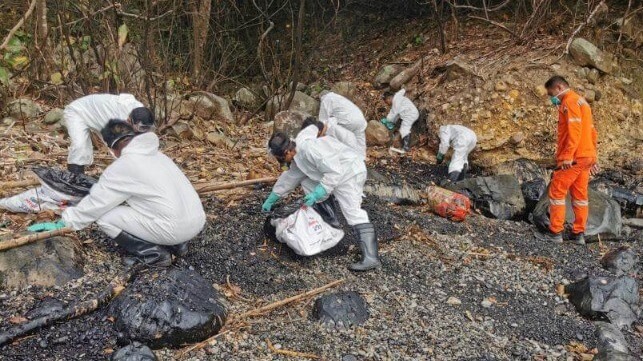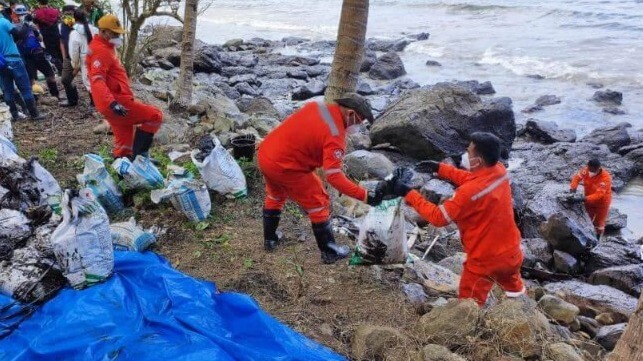Sunken Philippine Tanker May Have Sailed Without Required License
Officials warn that noncompliance on the casualty voyage could affect any insurance payout

The small tanker that sank off Oriental Mindoro on February 28 lacked the proper paperwork to sail, according to Philippine maritime administration MARINA.
In a hearing Tuesday, members of the Philippine Senate's environment committee criticized the shipowner and the Philippine Coast Guard for allowing the vessel Princess Empress to operate without proper permitting. The newly-built tanker was delivered in late 2022, and at the time of her loss in February, she was sailing without a required amendment to the operator's Certificate of Public Convenience (CPC), according to MARINA. Shipwoner RDC Reield Marine Services held a valid CPC for its overall business, but had allegedly not submitted all of the required paperwork to secure an amendment for the new vessel.
In testimony, RDC VP Fritzie Tee told the committee that the firm had completed the application in November; MARINA administrator Hernani Fabia countered that the application was missing needed documents - specifically financial information. A missing CPC would mean that Princess Empress could not legally sail on domestic voyages under Philippine law.
Two members of the senate committee predicted that the lack of complete paperwork for the casualty voyage could allow the vessel's insurer to deny coverage for the effects of the spill. The vessel had up to $1 billion in coverage for marine casualties, but the operator's alleged noncompliance could affect payout. "The insurance company will find a basis to not pay,” Sen. Cynthia Villar warned. "We should plan accordingly that we will not get that [payment]."
Given that any incomplete paperwork should have caused the vessel to fail a pre-voyage inspection, members of the panel excoriated the Philippine Coast Guard for allowing Princess Empress to leave the pier at all. “If you did your jobs, we would not be all here,” Sen. Raffy Tulfo told PCG officials.
Later Tuesday, the Philippine Coast Guard released documents appearing to show that MARINA had approved the tanker's CPC permit on November 16, contrary to testimony at the hearing.
Growing impact
An unknown amount of Princess Empress' 210,000 gallons of fuel oil has been released into the marine environment, and the contamination has spread along the length of Mindoro's eastern coastline, along with sections of the Caluya Islands. Nine communities have sustained varying levels of waterfront pollution, more than 120 people have fallen ill from petroleum fumes, thousands of fishermen are out of work, and the impact on the local tourism industry has yet to be quantified.
RDC's ability to provide compensation on its own is not known. The firm describes itself as a small corporation, and it operates out of a modest concrete office building on the outskirts of Manila. Though the firm's internal resources may be limited, the government of Oriental Mindoro has urged RDC to donate what it can in order to support affected fishermen and citizens. "We who caused the problem, it is incumbent upon us to extend whatever assistance we can," said Oriental Mindoro Governor Bonz Dolor on Tuesday.
Spill containment and cleanup efforts continue, and the Philippine government has appealed to the United States for technical assistance. The wreck lies in about 1,200 feet of water, too deep for divers to access, and any intervention to prevent further oil releases will require ROV technology.
As Oil Spill Spreads off Mindoro, Communities Weigh Legal Action

The local government of Pola, Oriental Mindoro is considering a lawsuit against the owner of the sunken product tanker Princess Empress, which went down with a cargo of fuel oil off the town's coast on February 28. The resulting petroleum release has polluted miles of beachfront on Mindoro's eastern shore, along with sensitive environmentally-protected areas and fishing grounds. More than a dozen people have reported symptoms of VOC inhalation, and thousands of local fishermen are out of work due to a fishing ban.
According to Jennifer Cruz, mayor of Pola, the shipowner first got in contact with local authorities on March 8, more than a week after the tanker went down. "They should, I told them, should in such an emergency, the immediate thing is that they go to the place where they should talk properly. It's not that they will turn off the phone or they won't really reply," she said, according to ABS CBN. "I told them not to be afraid to come forward, because they have to face their negligence."
The owner offered assistance, she said, but the aid duplicates existing provisions from government agencies, and she declined to accept it until after consultation with the provincial government.
In a forum convened Thursday by a consortium of environmental organizations, Liza Osorio, legal and policy director for Oceana, urged the Philippine government to hold the shipowner accountable through the courts. Philippine law contains antipollution statutes based on the "polluter pays" principle, and these rules should be used to pursue compensation for the affected communities, she said.
According to Ivan Andres, program lead at the think tank Center for Energy, Ecology and Development (CEED), the spill is having a substantial effect on the local economy, beyond its impact on fishing. "Livelihood impacts are being felt by businesses and workers alike," he said. "The no-fishing order and the prevention of tourism are a major hit to these businesses."
Meanwhile, the spill continues to drift to the south, and containment efforts have had limited success. The Philippine Coast Guard has deployed booms around the wreck site and is applying dispersant in an attempt to minimize the impact of the spill, but nine out of 15 communities in Oriental Mindoro have already been affected, along with areas in the Caluya Islands.
"Unfortunately, because of the prevailing wind condition brought by the [monsoon], the oil slick continues to spread," Dr. Irene Rodriguez of the the University of the Philippines Marine Science Institute told The Manila Times. "It will continue to follow this trajectory if the prevailing winds will continue in the next days."
No comments:
Post a Comment